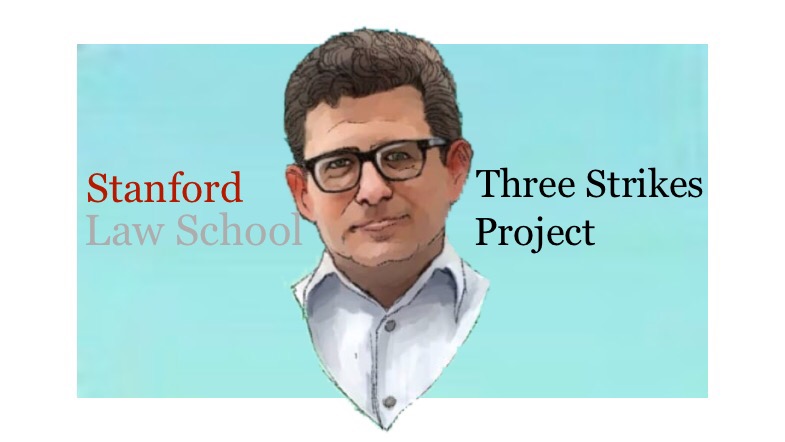CRIME STORY has received permission to re-print Michael Romano‘s newsletters from Stanford Law School’s Three Strikes Project whose mission is to reverse the most unjust criminal sentences. Romano and his colleague Susan Champion were interviewed by Amanda Knox for CRIME STORY and you can find the podcast and the transcript of that interview here. You can find a story about Romano’s participation in a U.S. Congressional field hearing on criminal justice reform here.
Gene McCallum was sentenced to life for stealing $2 in loose change from an empty motel room. After serving 15 years, and winning a landmark victory in the Court of Appeals last year, Gene finally walked out of San Quentin a free man, excited to see his family and start his life again!
In 2006, Gene was discovered in a vacant motel room in Los Angeles, saying he was using the bathroom. Police described him as “kind of spacey and mentally ill,” found a coin purse missing about $2, and arrested him for burglary. He was eventually sentenced to 30 years to life under the Three Strikes law.
Over a decade later, Gene came to the attention of prison authorities due to his exceptional dedication to rehabilitation. In 2019, the Secretary of the Department of Corrections personally and formally petitioned that his sentence be reduced because his incarceration was “no longer in the interest of justice.”
When we learned of Gene’s case, we began representing him in Los Angeles Superior Court based on the Secretary’s release recommendation—but it was too late. Despite the Secretary’s recommendation, the trial court denied the re-sentencing petition without notifying Gene or counsel, without a hearing, and without the opportunity to present evidence of Gene’s extraordinary rehabilitation showing that he would be an “asset” to the community if released, as the Department of Corrections had concluded.
Sadly, Gene’s case is not unique. Hundreds of cases have been referred for sentence reductions by the Department of Corrections under a new “second look” procedure we helped develop—only to be ignored by the courts.
Project Staff Attorney Milena Blake appeared before the Court of Appeals on Gene’s behalf last fall, persuading the justices that trial courts must seriously consider resentencing recommendations issued by the Department of Corrections and, at minimum, provide notice to the parties and allow them to present evidence of their rehabilitation.
It was a tremendous victory for Gene, the hundreds of others who earned an opportunity for a new sentence based on exceptional rehabilitation, and (oddly) for the Department of Corrections, which has been working to identify people deserving of a new chance at life outside of prison for several years. (Sadly, and also oddly, the Attorney General continues to fight these cases, arguing in court to limit the Department of Corrections’ power to recommend sentence reductions—and we’re litigating those cases too.)
After our victory at the appellate level, Gene’s case returned to the trial court, which had previously summarily denied his re-sentencing request. This time however, after hearing all the evidence—again presented by our stellar Staff Attorney Milena Blake—the trial court ruled that it was “definitely appropriate” to reduce Gene’s sentence and ordered his immediate release.
A few days later, Gene walked out of San Quentin and was met at the gates by Nate Williams from Choices for Freedom, part of the Ride Home program (which, incidentally, is beautifully featured in the excellent new Netflix docu-series Worn Stories, episode 3!).
Nate and Gene grabbed a smoothie and hit the road to Gene’s residential reentry program in LA. Gene said he felt like the Count of Monte Cristo, being released after 15 years behind bars. When he completes his reentry program at Amity Foundation in LA, he plans to leave California and reunite with his parents in New Orleans.
We couldn’t be happier for Gene or prouder of our whole team.
IN OTHER NEWS:
Last week, President Biden officially decreed that April was “Second Chances Month,” saying, among other things, that “supporting second chances . . . requires eliminating exceedingly long sentences and mandatory minimums that keep people incarcerated longer than they should be.”
We couldn’t agree more.
Federal prison authorities already have legal authority to identify deserving people in prison and request reduction of excessive sentences—a process virtually identical to the program California has been using for years and which led to Gene’s release. Sadly, federal prison officials have abandoned this power for decades and we know of no efforts by federal authorities to exercise their authority in this way.
It would be an excellent program to revive (as Jerry Brown did after decades of dormancy in California). It requires no new legislation, allows deserving people in prison a chance to re-litigate excessive sentences in open court, and affords judicial discretion and due process. So we hope President Biden and the Bureau of Prisons will give it a try. The water is warm!
Thank you all for your continued support!
– Mike


